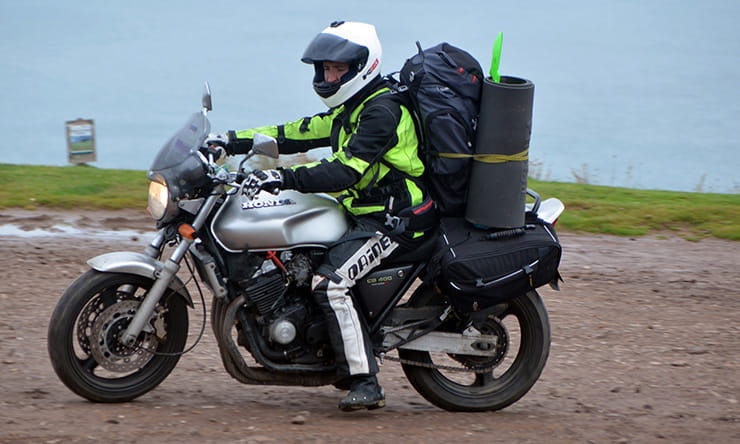Touring on two wheels is one of life’s greatest freedoms; you take your bike, load it with some gear and head off into the distance. But some people overthink things, and end up going nowhere.
When you strip it all back, it becomes a question of a few simple factors such as bike choice and what to pack. Nathan Millward has done it all, from travelling the world on a 105cc Honda to exploring Iceland on a BMW R1200GS; he knows how to get the most of his trips, and is currently running his Garbage Runs, where he takes groups of riders – on any bike – to explore the UK. In this series of articles, he explains how you really can tour on any bike at all..
PACKING
The temptation is to go overboard; to give yourself a lot of space and then to fill it with the things you think you need.
You have to fight that temptation, as all that gear just means more weight to lug around and more intimidation of a bike that's overloaded. There's nothing worse than being in a place you've never been before, trying to explore it and doing so on a bike that's top heavy and makes you nervous when doing tight turns or slow manoeuvres.
The best thing is to keep the weight down low, or as low as you can get it. Heavy items such as tools and cooking equipment sit at the bottom of panniers, light things at the top. If you use a top-box then keep its contents as light as possible – heavy weight in there will unsettle the balance of the bike.
Consider how long you're going for – whether you're going to be camping or staying in accommodation, what the weather's likely to be like and what you're going to need to make the trip comfortable.
Camping undoubtedly makes a huge difference to what you need to carry; a tent, sleeping bag, roll mat, possibly a pillow and cooking equipment all add considerable weight and mass. My preference is to use one 40-litre dry bag for all my camping gear. So in that goes the tent, sleeping bag, mat and pillow, plus whatever I can slip down the side. Cooking equipment would go in panniers, but if you go for a simple gas stove and simple cooking equipment then that might go in the dry bag as well.
Do you need to take cooking equipment? Sometimes food is so accessible – be it from nearby pubs, cafés or petrol stations – that you don't need the hassle of a stove. It's not as cheap this way, but it is more convenient and can seriously reduce your load.
The best advice when it comes to packing is to develop a system, and a place for everything, and stick to it. Designate a pannier as the 'kitchen' and the other as the 'wardrobe'. If everything has a place then it becomes easier and less stressful to find things. Also consider water ingress, as nothing is going to ruin your day more than a pannier and all its contents getting soaked. Are your panniers waterproof? If not, what can you do to remedy that? Small dry bags – bought cheaply from the likes of Sports Direct – are a great way of staying organised and keeping things dry.
In terms of a tank bag, try and put in there only the things that you might need immediately to hand to save it getting cluttered up.; camera, map, phone, documents and snacks are all things you might quickly need, and having them right in front of you is a huge convenience – especially the camera. If you have it tucked away in a pannier then chances are you're less likely to use it.
DO I NEED TRAVEL INSURANCE?
Just like any holiday, a trip on a motorcycle – be it in the UK, Europe or beyond – can be ruined by delays, lost documents, illness and more. There are plenty of travel insurance options, but you need to make sure you get a policy that includes riding motorcycles, and if it does, that it's for bikes of the engine size you'll be riding (many only cover up to 250cc). At its most basic, you should look for insurance that provides cover for the following:
Medical expenses
Loss or theft of personal possessions
Lost or delayed luggage
Loss of your passport and other documents
Travel delays and disruptions
Having to cut your holiday short
In addition though, if you’re taking a motorcycle (or you're renting one while you’re away) be sure that your insurer will cover you for any medical expenses, should you have an accident. You must also think about where you’re riding – some policies won’t cover you if you’re trail or enduro riding, or if you’re on a race track. Remember – this isn’t about your bike being covered, it’s about your medical expenses, should the worst happen.
If you're only going away once, a single-trip policy will likely be all you need, but also consider an annual policy, which could extend to cover your family holidays too (a good insurer should also be able to offer cover for your whole family).
To read the rest of BikeSocial’s advice on how to tour on any bike, click here
Share on social media:
